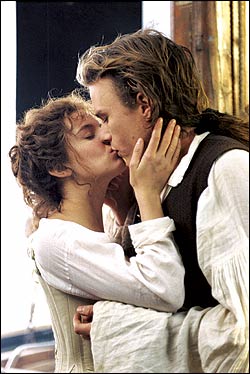I worried myself sick for years over Lasse Hallström. You never forget the enchanted time when you first fell in love with a director, but the protracted string of passionless duds since 1985’s My Life as a Dog and 1993’s What’s Eating Gilbert Grape turned me from lovesick for his one-of-a-kind style to heartsick for his loss of it. Where was the independent heart he once showed so winningly?
He’s poured it into his slick, commercial Casanova (which opens Sunday, Dec. 25, at the Metro and Meridian), a genre film like the studios used to make before they sank under the combined tonnage of overpaid stars, MBA suits, and overmilked cash-cow formulas. It’s a period costume romp, as silly as it wants to be. But it’s also a quality farce with heart, plus muted echoes of The Four Musketeers, Tom Jones, and Shakespeare in Love (not surprising, since Tom Stoppard helped polish the script).
It will certainly purge your unpleasantly leaden memories of that antidote to desire, Fellini’s Casanova. Heath Ledger, infinitely better-looking than Donald Sutherland at any age, athletically leaps the sexual-orientation divide from Brokeback Mountain, bounding out of a nun’s bed in the opening scenes only inches ahead of the bluenose authorities. She’s a novitiate, and Casanova has just turned her into Our Lady of Perpetual Indulgence. Her predecessors blow him kisses as he hops into his duds quicker than Bugs Bunny pursued by Yosemite Sam. No one expects the Spanish Inquisition; everybody in Venice circa 1750 expects the Italian Inquisition, because the worldly, kindly Doge (Tim McInnerny) alerts the sinners before the door’s knocked down. And since this is a Disney film, you know the über-rake won’t stay a sinner once he meets his one and only.
Unlike Fellini, Hallström makes it look like being Casanova might be fun. Especially at Carnevale time, when people doff their sensational-looking everyday outfits and put on those over-the-top outfits with masks that could tempt Dick Cheney into the old illicit slap and tickle. Venice is the prettiest beauty of all—few movies have done better in making the grande dame look young and lascivious. She’s more fetching even than Sienna Miller as Casanova’s ultimate prey, the anachronistic feminist Francesca, who sprouts unprecedented cleavage.
These two strike only modest sparks, but the pressure on them is lessened by the rambunctiously sprawling talent in support. Omid Djalili scores as Casanova’s clever servant, who helps him hunt for an overnight bride (otherwise the Inquisition will hang him). As Francesca’s mom, bent on marrying her off to the obese, obscenely rich lard merchant Oliver Platt, Lena Olin (Hallström’s wife) has an amusingly lean and hungry look. Francesca’s callow kid brother (Charlie Cox) yearns only for the virgin next door (Natalie Dormer). So when she’s affianced to Casanova to save his ass, he’s steamed and challenges him to a duel. The fool: He can’t fence. So Francesca impersonates the boy, stabbing Casanova with a Cupid-dosed foil.
And here’s a footnote salute to the impressively skillful Platt: Like so many plus-size talents, he’s been largely wasted by Hollywood because his girth terrifies the beauty-obsessed suits. Here he makes a clownish virtue of his heft and also slips in some humanizing touches. Don’t let him become another John Candy! With the character roles he deserves, he could become a latter-day Thomas Mitchell.
I won’t spoil by over-explication the further impersonations, switcheroos, discreetly smutty couplings, thwarted murders, shameless posing, and hairbreadth escapes by balloon, horse, coach, and gondola that ensue, filmed so prettily they evade being upstaged by the awesome backdrops. Let’s just say that Miller gets a career boost that must gall falling star Jude Law; loosening up from his Brokeback clench, Ledger proves to be every inch the flip ironic action mock-hero; and Jeremy Irons manages to put to rest the deadly memory of Merchant of Venice in the juicy role of Casanova’s nemesis, Inquisition majordomo Pucci. He hasn’t been this uproariously overarticulate since his definitive audio-book reading of Nabokov’s unexpurgated Lolita (which you must buy and hear immediately).
The often pedestrian repartee could’ve used yet another Stoppard polish to honor Irons’ chops, yet there’s plenty of compensatory wit in Hallström’s gratifying orchestration of chases, and more in the acting. Propelled by what I hope is Casanova‘s success (especially after An Unfinished Life, which he should’ve left that way), Hallström should aim higher still. If he can redeem Casanova’s misspent life, think what he could do for his own.








